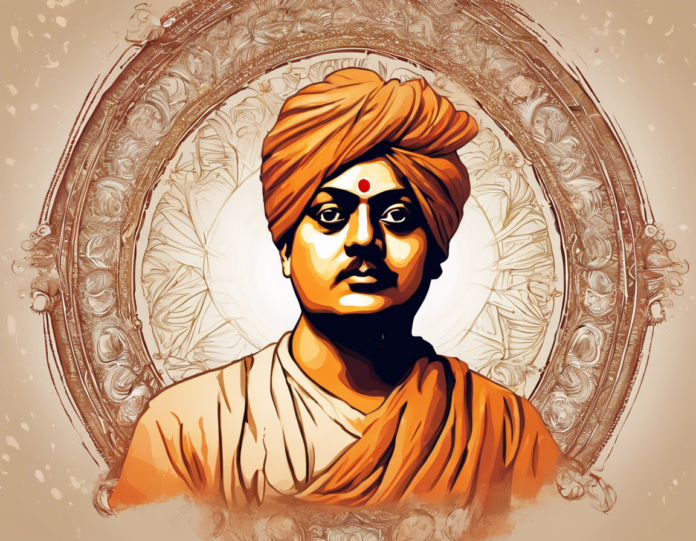Swami Vivekananda, born on January 12, 1863, was a revered Indian Hindu monk and philosopher who played a key role in introducing the Indian philosophies of Vedanta and Yoga to the Western world. His teachings on spirituality, self-realization, and the unity of all religions have inspired millions around the globe. As we celebrate Swami Vivekananda Jayanti, it is a poignant opportunity to reflect on his profound wisdom and timeless teachings that continue to resonate with truth seekers and spiritual enthusiasts worldwide.
The Life and Legacy of Swami Vivekananda
Swami Vivekananda, whose original name was Narendranath Dutta, was a disciple of the famous saint Sri Ramakrishna Paramahansa. He founded the Ramakrishna Math and the Ramakrishna Mission, which have been instrumental in spreading the teachings of Vedanta and serving humanity through various educational, healthcare, and relief programs.
Swami Vivekananda’s speech at the World’s Parliament of Religions in Chicago in 1893 was a groundbreaking moment that brought him international recognition. His opening words, “Sisters and brothers of America,” captured the hearts of the audience and laid the foundation for his message of religious tolerance, universal acceptance, and the divinity of the human soul.
Inspirational Quotes from Swami Vivekananda
1. “Arise, awake, and stop not until the goal is reached.”
This powerful quote encapsulates Swami Vivekananda’s call to action, urging individuals to strive relentlessly towards their aspirations and never succumb to setbacks or self-doubt.
2. “You have to grow from the inside out. None can teach you, none can make you spiritual. There is no other teacher but your own soul.”
Swami Vivekananda emphasized the importance of inner transformation and self-realization as the foundations of spiritual growth, highlighting that the true guru resides within each individual.
3. “In a day when you don’t come across any problems, you can be sure that you are traveling on the wrong path.”
This quote reminds us that challenges and obstacles are inherent in the journey of self-discovery and growth, serving as opportunities for learning, resilience, and spiritual evolution.
4. “Stand up, be bold, be strong. Take the whole responsibility on your own shoulders, and know that you are the creator of your own destiny.”
Swami Vivekananda’s words inspire individuals to embrace courage, self-reliance, and accountability in shaping their lives and destinies, empowering them to manifest their highest potential.
Teachings of Swami Vivekananda
Self-Realization and Divine Consciousness
Swami Vivekananda taught that every individual possesses an innate divinity and that the ultimate goal of life is to realize this divine essence within oneself. Through practices such as meditation, self-inquiry, and service to humanity, one can awaken to their true nature and experience a profound sense of interconnectedness with all of creation.
Unity of Religions and Universal Acceptance
Another cornerstone of Swami Vivekananda’s teachings was his belief in the underlying unity of all religions. He emphasized that diverse paths and faiths are like rivers flowing into the same ocean of truth, and that true religion transcends dogma and rituals, encouraging individuals to embrace the essence of love, compassion, and spiritual wisdom found at the heart of all faith traditions.
Service to Humanity and Social Welfare
Swami Vivekananda placed great importance on selfless service to humanity as a means of expressing one’s spiritual values in action. He envisioned a world where individuals work towards alleviating the suffering of others, promoting education, healthcare, and social justice for all members of society.
Frequently Asked Questions (FAQs)
1. What is the significance of Swami Vivekananda Jayanti?
Swami Vivekananda Jayanti is celebrated to honor the birth anniversary of Swami Vivekananda, a revered spiritual leader known for his teachings on spiritual enlightenment, self-realization, and the unity of all beings.
2. How can Swami Vivekananda’s teachings be applied in daily life?
Swami Vivekananda’s teachings can be applied in daily life by cultivating a practice of self-reflection, meditation, and service to others. Embracing qualities such as courage, compassion, and self-discipline can help individuals navigate life’s challenges with grace and wisdom.
3. What are some of Swami Vivekananda’s most famous quotes?
Some of Swami Vivekananda’s most famous quotes include “Arise, awake, and stop not until the goal is reached,” “You have to grow from the inside out,” and “Stand up, be bold, be strong.”
4. How did Swami Vivekananda contribute to the spread of Vedanta and Yoga in the West?
Swami Vivekananda played a pivotal role in introducing Vedanta and Yoga to the Western world through his lectures, writings, and participation in the World’s Parliament of Religions in Chicago. He emphasized the universal principles of Vedanta and the practical techniques of Yoga as tools for self-transformation and spiritual evolution.
5. What is the relevance of Swami Vivekananda’s teachings in contemporary society?
Swami Vivekananda’s teachings remain relevant in contemporary society as they offer timeless wisdom on personal growth, interfaith harmony, and social responsibility. His message of self-empowerment, unity in diversity, and service-oriented living continues to inspire individuals to lead meaningful and purposeful lives.
In conclusion, Swami Vivekananda’s life and teachings continue to serve as a guiding light for humanity, inspiring individuals to awaken to their higher potential, embrace diversity with compassion, and serve the world with love and humility. As we commemorate Swami Vivekananda Jayanti, let us reflect on his profound legacy and strive to embody his ideals of spiritual wisdom, social harmony, and selfless service in our daily lives.












